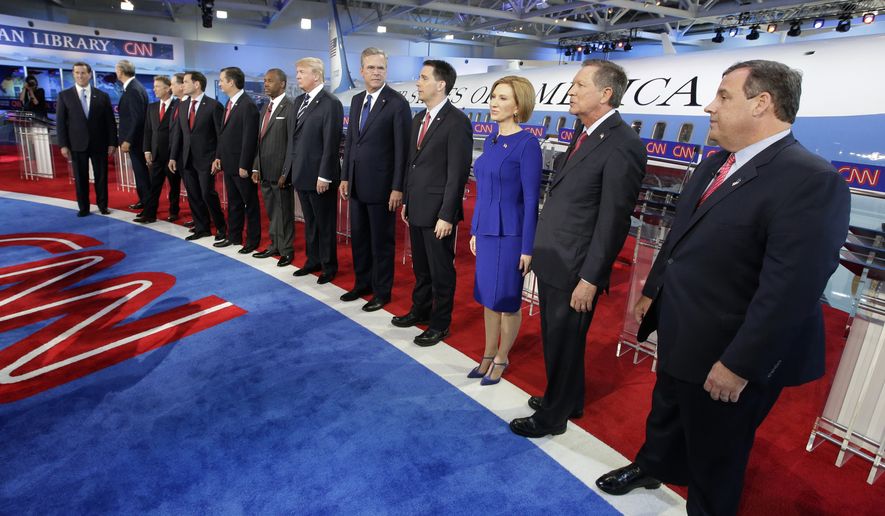As entertaining as the presidential debates may be, they are not likely to winnow the GOP field of any of the major candidates, say campaign strategists and analysts who say as long as the top-tier contenders have enough money, they’ll be able to last at least until the first votes are cast in Iowa’s caucuses and New Hampshire’s primaries.
And even though Donald Trump leads in both national polling and surveys in those two early-voting states, the candidates are still banking on him fading by next year, leaving the race wide-open again.
“The race is right now being influenced by celebrity,” Sen. Rand Paul, whose poll numbers have taken a nosedive, said on Fox News’ “The Kelly File” program Tuesday. “Two-thirds of the people in each of the polls is undecided, and the pollster says, ’Oh no, give us who you’re kinda leaning towards,’ so this is a leaner poll of undecided voters who may or may not be voters. So we’re not disheartened — in fact, we’re working even harder.”
Fickle voters also change, and many won’t decide on their picks until next year. That makes polling right now “meaningless,” said Andrew Smith, a political scientist and pollster at the University of New Hampshire.
“According to the exit polls, well more than half of the people who actually vote make up their minds in the last few weeks,” Mr. Smith said. “The stuff that’s going on right now is more about name recognition and what’s being talked about in the press — what the buzz is.”
In 2012, polls of Iowa GOP voters showed every single major candidate held a lead at some point, except for former Sen. Rick Santorum, who actually ended up winning the caucuses.
SEE ALSO: Carly looms as Hillary’s worst nightmare
Candidates are banking on the polls being a bad predictor once again, figuring if they can wait out the Trump effect, they may be the one to emerge in February, Mr. Smith said.
Recent polling indicates there are reasons for their optimism.
In the latest Washington Post-ABC News poll, 6 in 10 Americans said they don’t think Mr. Trump is qualified to be president, and more than four in 10 Republicans say they don’t think Mr. Trump has the temperament and personality needed to serve effectively as president. Moreover, a CBS poll released Tuesday shows that only a slim majority of voters who support Mr. Trump say they have locked in their votes, while 46 percent are open to switching candidates.
If the field remains large though, Mr. Trump could emerge as the leader while capturing pluralities of the vote in the early states, as the rest of the voters split on a dozen other candidates.
“The thing about having this many candidates in the race is that the smaller percentage can lead,” said David Winston, a Republican pollster. “There’s two elements to the race right now: One is clearly [that] there’s a dissatisfaction with political discourse. People see some of these candidates and hope to respond, but is the place they’re parking themselves at the moment going to be where they finally decide to be? Second, 30 percent is not 50 percent. What do you have to do to put
together a majority coalition to win?”
Mr. Winston said the race won’t be clearly decided until mid-March. Before then, the primaries and caucuses award nomination convention delegates proportionally, meaning even those who don’t win can still walk away with something to show for their efforts in each state. In March, however, winner-take-all contests will help front-runners quickly pile up delegates.
“The expectation for the first couple primaries is people will be splitting up these delegates, and so, with that, you’re going to have candidates hang in longer,” he said.
Super political action committees will also help elongate the life span of candidates like Texas Sen. Ted Cruz and former Florida Gov. Jeb Bush, who won’t necessarily have to win the first states to create the money or momentum they need to compete later on. That’s all barring an indictment or major gaffe that could end a campaign prematurely.
Some of the lower-tier candidates may not make it all the way. Former Texas Gov. Rick Perry was the first causality of the GOP primary season, dropping out of the race last week after he was unable to raise money or gain attention.
Mr. Paul said that was the push Republicans needed to help defeat Mr. Trump.
“I really think, ironically, Gov. Perry leaving the race was a wake-up call to everybody that, goodness, we’re losing candidates that were three- or four-term governors of large Republican states, and yet a reality-TV star who’s most famous for insulting people is somehow leading the pack,” Mr. Paul said on Fox.
Mr. Trump’s dominance will dissipate when he begins to face attack ads from other candidates or advocacy groups and when cable news networks cut back on their coverage of him, said Katie Packer Gage, a Republican consultant who was Mitt Romney’s deputy campaign manager in 2012.
“He’s going to enjoy that front-runner status for a while because people are just so angry at the establishment,” Ms. Gage said. “But he’s sitting there at 27 percent, with 73 percent of Republicans not wanting to be with a guy that they already know everything about.”
The Club for Growth, a conservative advocacy group that has successfully derailed a number of Republicans’ congressional campaigns through its attacks, announced this week it will run $1 million worth of ads against Mr. Trump in Iowa. They will accuse him of being a closet liberal and will highlight his support for using eminent domain powers to surmount private property rights.
• Kelly Riddell can be reached at kriddell@washingtontimes.com.




Please read our comment policy before commenting.